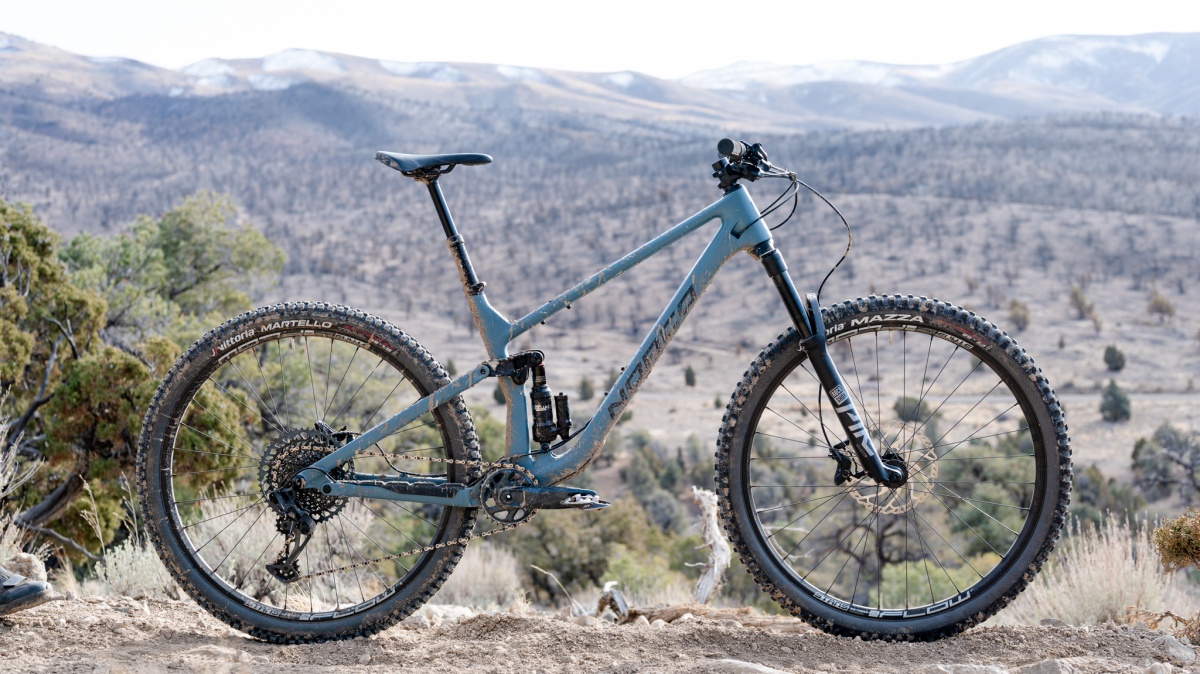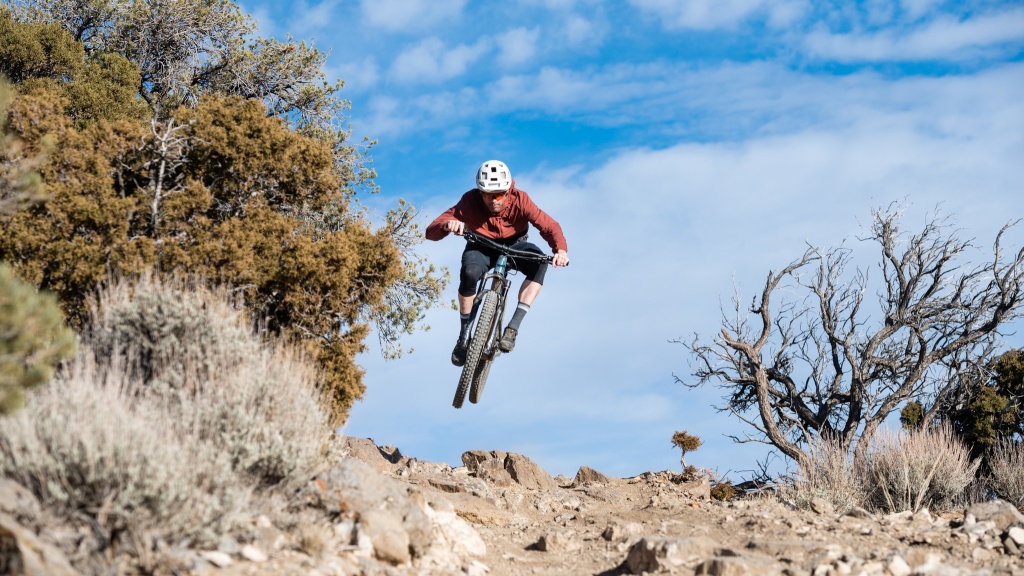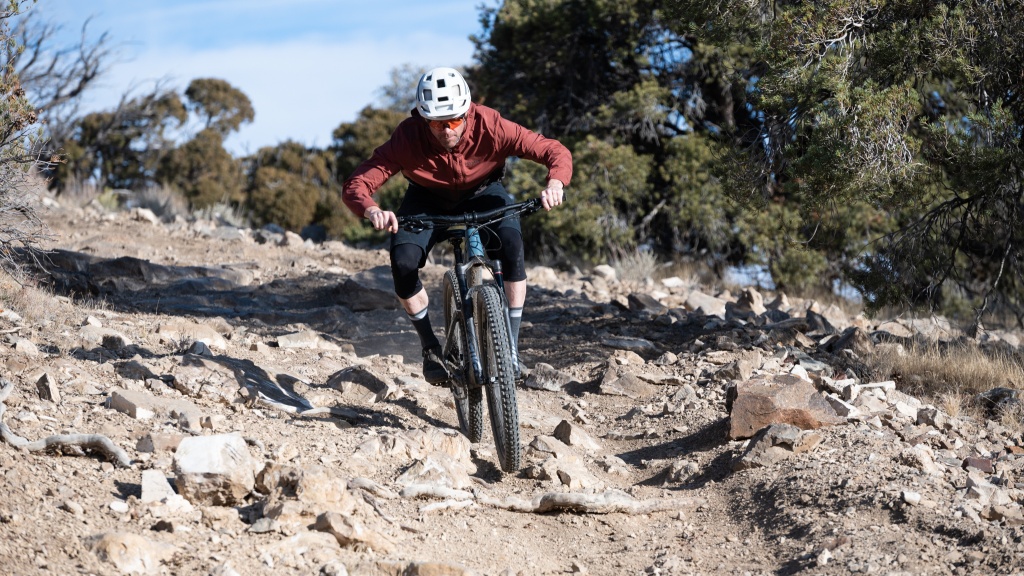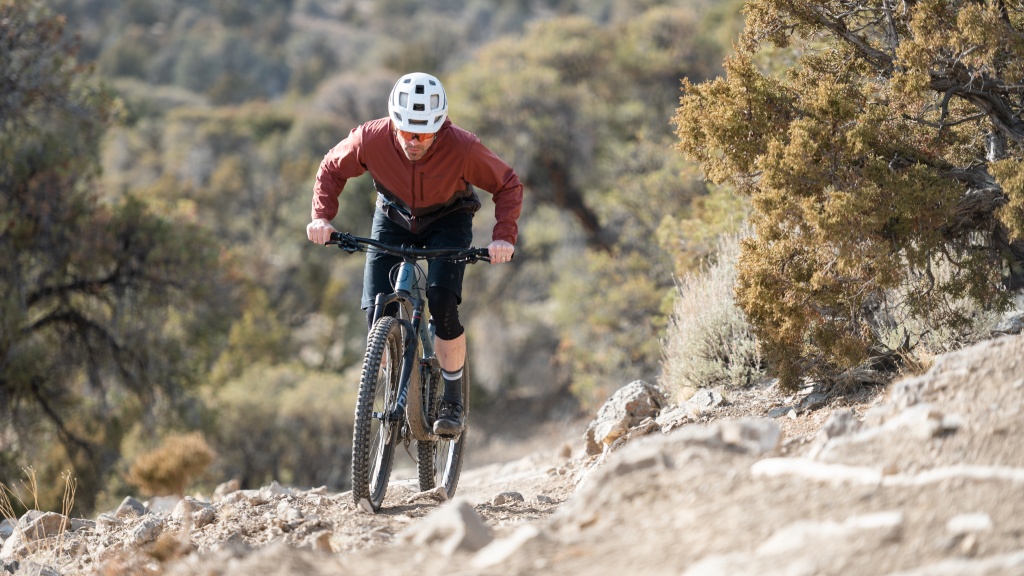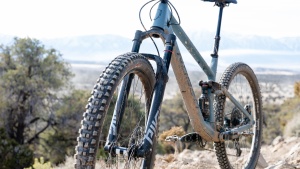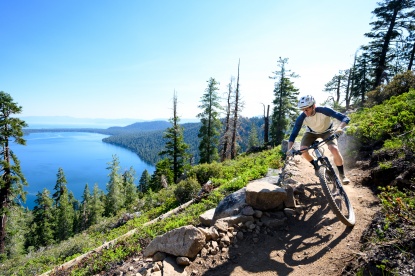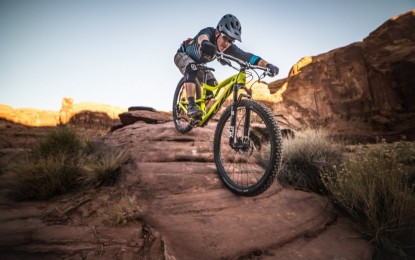Norco Optic C2 SRAM Review
Our Verdict
Our Analysis and Test Results
Should I Buy This Bike?
If you're an aggressive trail rider who prefers a little less travel or your trails don't require a heavy-hitting long-travel rig, the Norco Optic may just be the perfect bike for you. Norco redesigned the Optic for the 2020 model year, positioning it squarely in the quickly growing aggressive short-travel trail bike bracket. Despite its relatively modest 125mm of rear-wheel travel, its downhill performance is dictated by its modern, aggressive geometry, and this bike descends with the confidence and composure of a bike with more travel. It's got a thirst for the fall line, an appetite for steep and chunky descents, and it really comes to life as speeds increase. The suspension platform is dialed, it's surprisingly supple off the top, supportive when you want it to be, and it's progressive enough to handle bigger hits without bottoming out. On the climbs, it has a calm pedaling platform, and the steep seat tube lines the rider up for direct power transfer and a comfortable seated position. It's not the zestiest or snappiest climber, but it's plenty competent and can claw its way up just about anything. The C2 SRAM build we tested is pretty nice for the price and is ready to rip without the need for any immediate upgrades. We were thoroughly impressed with the Optic, and we feel this is the best aggressive short travel bike we've tested.
The Marin Rift Zone Carbon 2 is a very similar bike to the Optic C2. It also features 125mm of rear-wheel travel and has a relatively aggressive geometry, although it comes with a slightly shorter, 130mm fork. The Marin has a marginally steeper head tube angle at 65.5 degrees, along with a shorter wheelbase and chainstays. It's impressively versatile and capable on the descents, although the Optic feels a bit more stable at speed and in super aggressive terrain. Both bikes have relatively comparable build kits and price points, although the Pike fork on the Optic feels a bit sturdier than the Fox 34 specced on the Marin.
The Santa Cruz Tallboy is another 29er that's short on travel but is still plenty capable. The Tallboy has 120mm of rear-wheel travel and a 130mm fork, with similar but slightly more conservative geometry. The Tallboy strikes us as a bit more well-rounded, a swift and efficient climber with competent descending abilities. The Optic doesn't climb quite as well, but feels more confident and composed in steeper, rougher terrain, and at higher speeds. We'd steer people who prioritize downhill performance towards the Optic, and those seeking efficiency and versatility towards the Tallboy.
Frame Design
Norco redesigned the Optic trail bike for the 2020 model year. The previous version was a short travel bike with relatively conservative geometry that leaned towards the XC side of the riding spectrum but was a little heavy to really excel in that category. The new Optic got a major overhaul, turning it into a definitively aggressive short travel ripper. The front triangle is made of carbon fiber, while the rear triangle is crafted from aluminum. Norco employs a Horst-Link, or four-bar, system to control the 125mm of rear-wheel travel. This design features a pivot attached to the seat tube just above the bottom bracket with a rocker link attached midway up the seat tube and a chainstay pivot just forward of the rear axle. The rocker link drives a vertically-oriented, inverted RockShox Super Deluxe Ultimate DH shock. The frame features internal cable routing, integrated chainstay and downtube protection, room for a full-size water bottle, and a mount on the underside of the top tube for a frame-mounted tool kit. The Optic comes in 4 sizes, S, M, L, and XL.
The Optic has geometry measurements that were unheard of on short travel bikes until the past couple of years. It is much longer and slacker than its predecessor and its impressive downhill capabilities are a result of this modern design. Our size large test bike had a 65-degree head tube angle and a relatively steep 76-degree seat tube angle. The effective top tube measured 637mm with a roomy 480mm reach and a long, 1235mm wheelbase. The chainstays/rear center on the Optic are size-specific, increasing in 5mm increments between each frame size, and they were 435mm long on our size Large. Our test bike tipped the scales at 30 lbs 12 oz set up tubeless without pedals.
Design Highlights
- 29-inch wheels only
- 125mm of rear-wheel travel
- Designed around a 140mm fork
- Carbon front triangle paired with an aluminum rear triangle
- Ride Aligned design system
- Size-specific chainstays
- Internal cable routing
- Integrated downtube and chainstay protection
- Complete builds ranging from $3,799 to $8,999
- Available as a frame and shock only for $2,449
Downhill Performance
There's no doubt about the fact that the Optic was designed to perform on the descents, and it truly impressed our testers, particularly for a bike with 125mm of rear-wheel travel. Make no mistake, this isn't some confused “down-country” bike, this is a full-on trail bike that doesn't over-promise and under-deliver. The geometry is quite aggressive without being over the top, and the Optic handles speed, steeps, and chunky trails well beyond its short-travel pay grade. The rear suspension performs very well, and the C2 SRAM build on our test bike is ready for action.
Geometry is the primary factor that influences a bike's downhill performance, and Norco gave the Optic an aggressive, trail-eating design. It's modern, with plenty of length and the right angles to charge hard on the descents, without being so extreme that it becomes tough or awkward to deal with. Considering its travel length, it has a long, 1235mm wheelbase and 480mm reach on our size large test bike. Combine that length with 435mm chainstays and a low 337mm bottom bracket height, and it has a comfortable between the wheels feel with excellent stability at speed. The 65-degree head tube angle only adds to the stable feel and provides a confident front end that likes to be pointed down the fall line, and it feels eager to get up to speed. We found that a centered body position felt amazing on this bike, whether smashing through a rock garden or railing a berm. In fact, the Optic felt composed and comfortable in nearly all situations on the descents, with responsive and predictable handling. Due to its length, super tight technical riding at slower speeds isn't this bike's forte, although it still does pretty well in those situations with a skilled pilot behind the bars. It's also not the most playful bike we've tested, but it's got a surprising amount of pop and liveliness to it.
We were particularly impressed with the suspension performance of the Optic, and Norco has done a fine job of maximizing what 125mm can do. All Optic models come with the same custom-tuned RockShox Super Deluxe Ultimate DH rear shock that is driven by a Horst Link suspension design. Norco also uses their Ride Aligned design system to dial in both the fit and the desired suspension performance of the Optic. The Norco website has a bike setup guide where you enter your personal stats and it recommends shock pressures, volume spacers, and rebound/compression settings. We used these recommendations as a baseline for setup and tweaked them slightly for personal preferences. That said, we found the rear suspension to feel supple and slippery off the top with excellent small bump compliance. In the mid-stroke, it reacted very well to high-frequency hits and chop, with enough support to push off of and not blow through the travel. On bigger hits, the Optic gives the feel of having more travel than it does with a subtle but very effective ramp-up at the end of its travel. Considering the drops and sketchy lines this bike encourages, we rarely felt the rear suspension bottom out during testing.
The C2 SRAM build we tested is the 2nd least expensive offered, but it's nicely equipped and performs well on the descents. The RockShox Pike Select+ fork controls the 140mm of front end travel with a sturdier feel than the Fox 34 forks found on many other bikes in this travel bracket. The 4-piston Shimano MT520 brakes work well enough and have ample stopping power to control the speeds the Optic likes to carry. The cockpit setup is nothing flashy, but the 780mm wide bars and short stem provide plenty of steering leverage, and the DMR Deathgrip grips are quite comfortable. Out back, an X-Fusion Manic 150mm (size Large) dropper keeps the saddle low. The Vittoria tires are a departure from the norm, and we're big fans of the Mazza as front tire, with the versatile Martello in the back, although we'd probably swap them out for something a bit wider with a little more air volume. The lowest point of the build, in our opinion, is the wheelset that consists of Stan's Flow S1 rims and DT Swiss 350 hubs. The freehub engagement of the DT Swiss hubs is sub-par, and the rims feel like their days are numbered on a bike that charges as hard as the Optic. That said, they get the job done, but would likely be the first thing we'd upgrade.
Climbing Performance
The Optic is competent and capable on the uphills, though climbing isn't its strongest suit. If you're the type who likes to compete for KOMs on the climbs, we suggest looking elsewhere, but if your only reason for climbing is to shred back down, the Optic definitely has you covered. Don't get us wrong, this bike climbs well and leaves little to be desired, it just can't compete with some of the snappier, more efficient competition.
Norco gave the Optic some geometry touches that give it a comfortable seated climbing position. The 480mm reach on our size large test bike is quite roomy, although the steep 76-degree seat tube angle helps to keep it from feeling too long. That steep seat tube angle lines the rider up nicely above the cranks, and power transfer feels direct and efficient. Combined with the 435mm chainstays (size large), the steep seat tube angle helps keep your weight from being too far out over the rear wheel. It's got a relatively long wheelbase and slack head tube angle, but we found its front end to stay planted on steep climbs. Uphill handling felt intuitive and responsive, but low-speed technical puzzles and super-tight switchbacks required more skill and planning than on shorter, steeper bikes.
Norco specs the same RockShox Super Deluxe Ultimate DH shock on all of the Optic builds. This shock does not have a compression damping/climbing switch, and for the most part, we didn't really mind. The Horst-Link design provides a relatively calm pedaling platform both in and out the saddle that has very little unwanted suspension movement and provides loads of climbing traction. While we wouldn't call it a deal-breaker, we did miss having a climbing switch for those inevitable dirt or paved road climbs while spinning back up the hill for another lap.
The components on the C2 SRAM build we tested work well on the climbs. The SRAM GX Eagle drivetrain is crisp and precise, and the 11-52-tooth cassette provides a massive range for any steepness of trail. The new GX cranks also have a great finish and look nicer than the previous version. The Vittoria Martello rear tire has a versatile tread pattern that we found to provide great climbing traction and worked well in a huge range of conditions. The Fi'z:ik Alpaca X5 saddle was also a pleasant surprise and was more comfortable than we expected.
Photo Tour
Value
The Optic C2 SRAM we tested retails for $4,399. Considering how much we enjoyed riding it, we feel it is a pretty good value for the rider who seeking aggressive downhill performance in a short travel package. The C2 SRAM build we tested isn't particularly flashy, but it's a perfectly functional package, and nothing needs to be upgraded to get out and shred. If the C2 is a little more than you're willing to spend, the C3 costs $650 less and the build is impressive for the price. Additionally, The C2 comes in a Shimano build with an XT drivetrain and brakes, and a Fox 36 performance fork for only $50 more than the model we tested. There are also two more expensive build options for those willing and able to spend a bit more.
Conclusion
If you're looking for a shorter travel bike that absolutely rips on the descents, the Norco Optic is worth a long, hard look. While many other bikes in this travel bracket are slightly beefed up XC race bikes that are extremely efficient but still somewhat scary to descend on, Norco took a completely different approach. It may not be XC light or the most efficient on the climbs (it still climbs pretty darn well), but that's not the intention with the Optic anyway. This bike was designed to perform on the descents, and it does exactly that.


